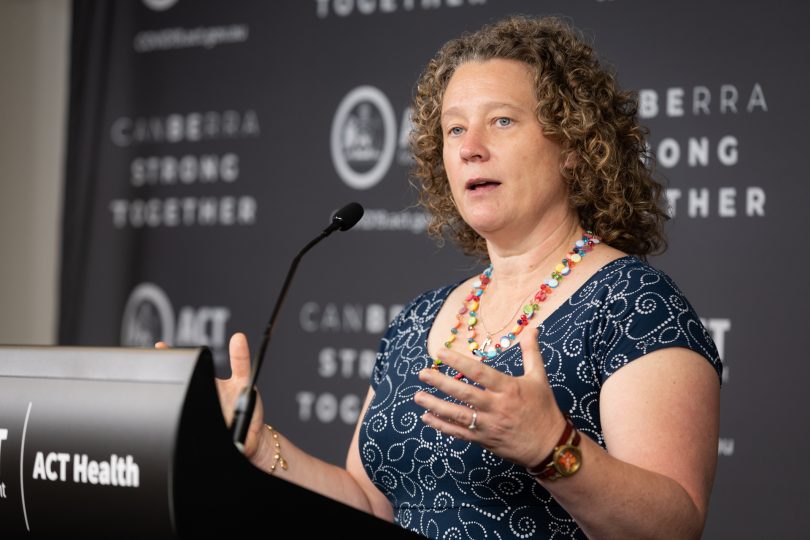
Dr Kerryn Coleman: people should continue to monitor for symptoms and get tested if they start to experience even the mildest of symptoms. Photo: Michelle Kroll.
People in the ACT who had been in Greater Brisbane on or after 2 January will no longer be required to quarantine for two weeks after the Queensland Government decided not to extend its initial three-day lockdown.
ACT Chief Health Officer Dr Kerryn Coleman also said that the ACT no longer considers Greater Brisbane a COVID-19 affected area, and thousands of ACT residents and non-residents can now leave quarantine and travel can resume between the two states.
“I have made this decision after carefully considering the broader risk to the ACT community and also following my discussion with Queensland Chief Health Officer Dr Jeannette Young on the situation in Queensland,” Dr Coleman said.
The approximately 4,800 people in quarantine will be informed of today’s decision via SMS.
Last Friday, Queensland instigated a three-day lockdown of Greater Brisbane after a hotel quarantine worker in Brisbane was diagnosed with the more infectious UK-variant of COVID-19.
“The early signs are positive, however, we will not know if the variant has spread further until at least a full 14 days after the last day the infectious case was in the community,” Dr Coleman said.
”While those people affected are not required to undertake a COVID-19 test upon leaving quarantine, they are reminded to continue to monitor for symptoms and get tested if they start to experience even the mildest of symptoms.”
Dr Coleman said those coming out of quarantine or who have been in Brisbane during this time should check the Queensland Health website daily.
If identified as a close contact by Queensland Health, or if you have been to any one of the contact tracing locations, follow Queensland Health’s advice immediately and contact ACT Health on 6207 7244.
”This is essential to minimise the risk of seeding of the virus to the ACT,” Dr Coleman said.
Restrictions for impacted areas of Greater Brisbane will be eased from 6:00 pm today and ACT residents currently in the Greater Brisbane area will need to follow the Queensland Health advice, including wearing a mask for a further 10 days.
“We want to thank the ACT community for doing the right thing to keep our community safe,” Dr Coleman said.
“I would like to thank all those affected, including our local hotels and accommodation providers, for your cooperation and patience during this time.”
The advice for NSW remains unchanged, meaning non-ACT residents who have been to a NSW hotspot must not travel to the ACT without an exemption.
ACT residents returning from COVID-affected areas of NSW can still return to the ACT, but must notify ACT Health of their intention to return via the online declaration form and enter quarantine for 14 days from when they were last in a COVID-affected area.
Non-ACT residents from areas of NSW that are not hotspots can enter the ACT but they are urged to reconsider any non-essential travel into the ACT at this time.
ACT Health is still urging the ACT community not to travel to Greater Sydney, the Central Coast or Wollongong. It recommends people who have returned to the ACT from Victoria check back in to make sure they haven’t been in contact with a confirmed case by visiting Case Locations and Outbreaks. Anybody who has been in one of the locations at the times listed should follow the health advice of the Victorian Government.
There have been no new cases of COVID-19 recorded in the ACT in the past 24 hours. There are no active cases in the ACT at this time.
For more information, visit COVID19.ACT.
Original Article published by Ian Bushnell on The RiotACT.





